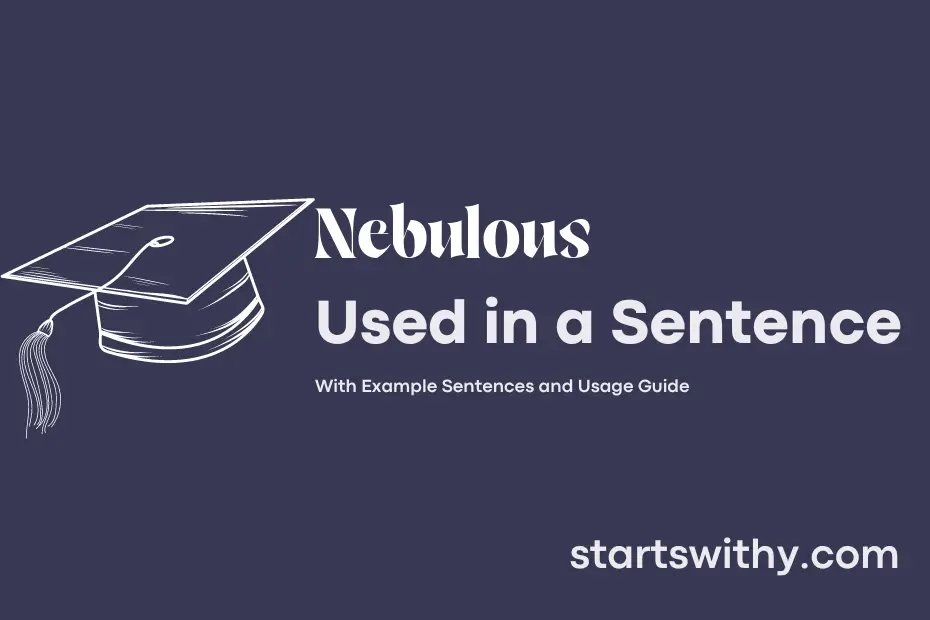Have you ever come across a word that seems to embody a sense of ambiguity and vagueness? Enter the world of the nebulous, where uncertainty and haziness cloud the meaning of a term.
Nebulous is an adjective that describes something vague, indistinct, or unclear. It often refers to ideas, concepts, or situations that lack clarity or are difficult to define precisely.
7 Examples Of Nebulous Used In a Sentence For Kids
- The nebulous cloud looked like a fluffy sheep in the sky.
- I saw a nebulous shape in the fog that disappeared quickly.
- The artist painted a beautiful nebulous rainbow on the canvas.
- The dream was filled with nebulous colors and magical creatures.
- When I blow bubbles, they become nebulous and float in the air.
- The fire created nebulous shapes dancing in the darkness.
- The nebulous mist covered the mountains like a soft blanket.
14 Sentences with Nebulous Examples
- Nebulous concepts in quantum physics can be quite challenging to understand for college students.
- The professor’s explanation of the topic was so nebulous that many students were left confused.
- Students often struggle with grasping the nebulous concepts of existentialism in literature.
- The nebulous instructions given for the project left many students feeling uncertain about what was expected of them.
- The nebulous implications of post-modernism can be difficult to interpret without proper guidance.
- Trying to navigate the nebulous world of internships and job prospects can be overwhelming for college students.
- The student’s essay was filled with nebulous arguments that lacked clear evidence to support their claims.
- The professor’s feedback on the presentation was quite nebulous, leaving the students unsure of how to improve.
- Deciphering the nebulous meanings in ancient texts requires a deep understanding of the historical context.
- The debate over the ethics of artificial intelligence can sometimes feel nebulous to students without a background in technology.
- The nebulous boundaries between plagiarism and paraphrasing can lead to unintentional academic misconduct.
- The professor’s lecture on cultural relativism was so nebulous that students struggled to differentiate it from moral relativism.
- The nebulous nature of the research question made it difficult for students to formulate a clear hypothesis.
- The nebulous guidelines for group projects often lead to confusion and miscommunication among team members.
How To Use Nebulous in Sentences?
Nebulous is used to describe something that is unclear, vague, or lacking definite form.
To use Nebulous in a sentence, start by identifying a situation where something is not clear or easily understood. For example, “The instructions for the assignment were so nebulous that the students were unsure where to begin.”
Remember to place the word Nebulous within the context of the sentence where it is describing something uncertain or indistinct. It can be used to convey a sense of ambiguity or confusion.
Here are a few more examples of how to use Nebulous in a sentence:
- “The future of the project remained nebulous as conflicting reports continued to surface.”
- “Her memory of the event was nebulous at best, with details fading over time.”
- “The artist’s nebulous painting left viewers wondering about its meaning and interpretation.”
By incorporating Nebulous into your writing, you can effectively convey the idea of something unclear or lacking definition. Practice using it in various sentences to become more comfortable with its usage and nuances.
Conclusion
In conclusion, sentences containing the word “nebulous” often describe ideas or concepts that are unclear, vague, or hazy. The word implies a lack of clarity or definition, leaving room for interpretation or uncertainty. When faced with nebulous information or instructions, it can be challenging to understand the intended meaning or purpose. It is important to seek clarification or additional context to avoid confusion and ensure effective communication.
Overall, recognizing and addressing nebulous language can help improve communication and decision-making processes. By striving for clarity and specificity in our sentences and conversations, we can enhance understanding and facilitate more meaningful exchanges. Awareness of nebulous language can empower us to ask the right questions, seek clarification, and promote clearer communication in all interactions.



